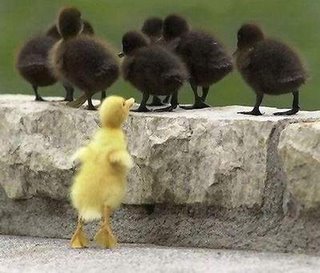In many of the diversity classes that I teach, I often begin the day by asking people why they registered for the class and what they hope to learn. A fairly common response (always from a white person, and usually from a white man) is that they want to learn to be "color blind."
And I'm always a little stumped by this response.
First of all, I'm not sure it's possible. When I meet someone with dark skin, African features, and kinky hair, I tend to notice that he or she is black. I can't imagine anyone meeting my office mate, for example, and saying the next day, "Was she African-American? Huh. I didn't notice." And if anyone did say such a thing, I don't think I'd respect them for it; I might actually wonder if their low levels of observation border on mental deficiency.
But of course, this isn't really what people mean when they say "color blind." They mean that they want to evolve to a point where race doesn't matter -- where they see people as people, not making assumptions about anyone based on their race. And that's a lovely thought, truly. Except that it usually doesn't work that way either.
If and when a white person (and I feel okay about picking on white people, because I am one and because it's always a white person who makes this statement in my class) acheives this type of color-blindness, he or she might believe that they're just seeing people as people -- but in my experience, they're really seeing everyone as a white person, whether the person is white or not.
The thing is, race isn't just skin deep, and underneath, we're not all the same. Growing up in a black family isn't the same is growing up in an Asian family, which isn't the same as growing up in a Latin family or a white family. These differences are compounded when you grow up in a predominantly homogenous community (Ever been to a black church? ... I've been only a few times, but the experience is 180 degrees from going to a staid, solemn mass with my folks). And even if we were all the same on the inside (which we're not), the external experience of being a person of color is different than growing up as a white person. People of color experience institutional racism nearly every day -- they learned how to survive in a racist world since they could walk and talk -- and a lot of well-meaning white people have no idea what life as an oppressed minority is like.
 So -- when these well-meaning white people see everyone as "just people," they often do not have the skills or knowledge to see anyone -- white, black, Latin, or Asian -- as anything other than "just like me." They convince themselves that race is a purely cosmetic condition with no deeper cultural implications, and begin to expect everyone around them to see the world the way they see it, to value the same things that they value, and to behave the same way that they behave. And to a person of color, that looks and feels a whole lot like racism.
So -- when these well-meaning white people see everyone as "just people," they often do not have the skills or knowledge to see anyone -- white, black, Latin, or Asian -- as anything other than "just like me." They convince themselves that race is a purely cosmetic condition with no deeper cultural implications, and begin to expect everyone around them to see the world the way they see it, to value the same things that they value, and to behave the same way that they behave. And to a person of color, that looks and feels a whole lot like racism.As a gay person, I deal with some of that frustration when interacting with lots of well-meaning straight people who want to believe that I'm just like they are, only I'm attracted to guys. The truth is, being gay provides an interesting lens through which to see the world. My thoughts, feelings, and perspectives on a myriad of topics, not just love and dating, are affected by my identity as a gay man. Off the top of my head, living the big gay life has significantly changed the way I view the role of women in society and the dynamic that exists between science and religion, and my feelings about going to five weddings each summer, where I plan to go on vacation (or dinner, for that matter), the G.I. Bill, and how long I'll stay at the office happy hour at the T.G.I.Friday's down the street (not very, in case you were wondering).
And if I ever heard a straight person say, "I keep forgetting that he's gay; it's just not an issue for me," they'd likely be giving themselves points for open-mindedness, while I'd likely think to myself, wow ... you really don't know this person very well.
So I'd like to do what little I can to help people realize that metaphorical blindness is not a virtue; rather, it's just ignorance - except that it's worse, because it's willful ignorance. And it doesn't help society as a whole; the irony is that it only helps the ignorant, ever more comfortable, not having to think about things which otherwise might give them pause. Because, y'know ... thinking is hard.
No comments:
Post a Comment